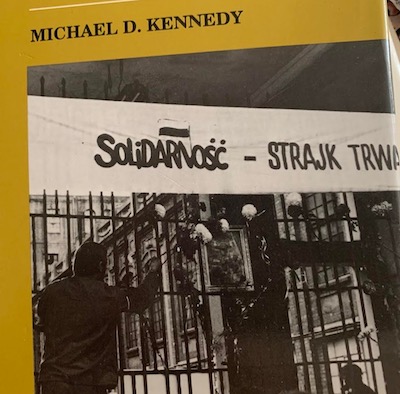 On August 31st, 1980, an agreement was signed allowing for the formation of the Independent Self-Governing Trade Union Solidarity. In the middle of July 2020, Prof. Michael Kennedy recorded this video for a Polish foundation, Centrum Historii Zajezdnia, reflecting on what Solidarity was 40 years ago, and where we might see it today. Building on work by Michal Luczewski and his colleagues, Dr. Kennedy proposed that we should see in Black Lives Matter an extension of the reflexive and transformative movement pictured in this caption's photo.
On August 31st, 1980, an agreement was signed allowing for the formation of the Independent Self-Governing Trade Union Solidarity. In the middle of July 2020, Prof. Michael Kennedy recorded this video for a Polish foundation, Centrum Historii Zajezdnia, reflecting on what Solidarity was 40 years ago, and where we might see it today. Building on work by Michal Luczewski and his colleagues, Dr. Kennedy proposed that we should see in Black Lives Matter an extension of the reflexive and transformative movement pictured in this caption's photo.
Solidarność, with Michael Kennedy
On 8/31/20 the Polish movement, Solidarność, can be called 40 years old.
Prof. Kennedy Writes
“This 16 minute video covers a lot of ground world historically, but it reflects my own deep transformations too, and while I won't name everyone that has influenced me, let me mark a few here who are directly implicated in this video. David Ost is the scholar, and photographer, whose work is on my first book's cover. My Polish friends in the movement, named in that book, took an American without any Polish grounding beyond Polish language lessons and an admiration for Polish sociology into their world. Certainly the University of Michigan's Polish studies program with Marysia Ostafin (whose enduring commitment to that program and Poland has been remarkable), enabled my Polishness to grow beyond my first time in the country in 1983-84. Were I to have made that mid-July video today, I would certainly have marked those friends and colleagues I came to know through European Humanities University, notably now reporting from the streets of Belarus Maksimas Milta and Jana Paliashchuk, extending the solidarity that their society certainly deserves. That 40 year old connection between Poland and Belarus should be obvious. Unfortunately, connections between Black Lives Matter and these central European struggles are not so typical, but they should be. In all these circumstances, recognition of the realities of oppression and exploitation has moved remarkable movements of radical love promising a better world. Certainly I am grateful to my friend David Kyumin Kim, himself a friend and former student of Cornel West whom I cite in this video, has moved my own sense of radical love's power and potential. But in the end I want to thank my students in last fall's course on contradictions, solidarity and reflexivity, Jocelyn Bell, Nabila Islam, and Alejandra Irene Cueto Piazza for their openness to considering how a sociology of love and solidarity might be elaborated. This is my first serious reflection on that project, and dedicated to the prospect of solidarity's extension not only among our familiars, but with soulful introspection about where goodness rests in the midst of oppressions across the world.”